九年级英语全册 Unit 6 When was it invented(第4课时)Section B(1a-1e)习题课件 (新版)人教新目标版
人教版英语九年级全册单元unit 6 知识点+测试卷+思维导图
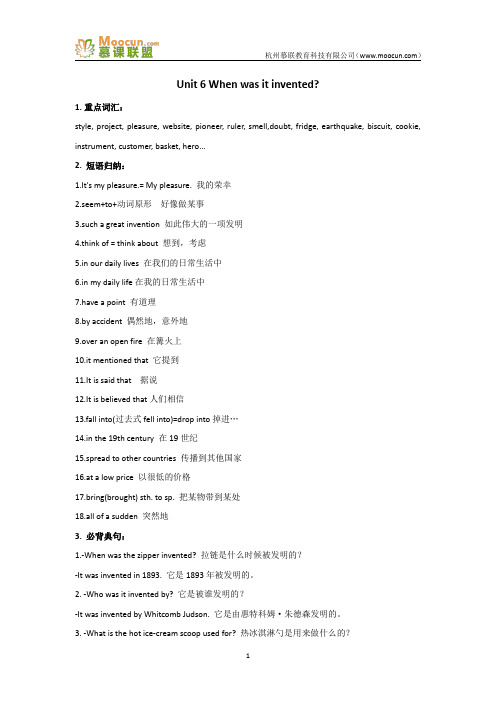
Unit 6 When was it invented?1.重点词汇:style, project, pleasure, website, pioneer, ruler, smell,doubt, fridge, earthquake, biscuit, cookie, instrument, customer, basket, hero...2. 短语归纳:1.It's my pleasure.= My pleasure. 我的荣幸2.seem+to+动词原形好像做某事3.such a great invention 如此伟大的一项发明4.think of = think about 想到,考虑5.in our daily lives 在我们的日常生活中6.in my daily life在我的日常生活中7.have a point 有道理8.by accident 偶然地,意外地9.over an open fire 在篝火上10.it mentioned that 它提到11.It is said that 据说12.It is believed that人们相信13.fall into(过去式fell into)=drop into掉进…14.in the 19th century 在19世纪15.spread to other countries 传播到其他国家16.at a low price 以很低的价格17.bring(brought) sth. to sp. 把某物带到某处18.all of a sudden 突然地3. 必背典句:1.-When was the zipper invented? 拉链是什么时候被发明的?-It was invented in 1893. 它是1893年被发明的。
2. -Who was it invented by? 它是被谁发明的?-It was invented by Whitcomb Judson. 它是由惠特科姆·朱德森发明的。
人教版英语课件九年级Unit-6whenwasitinvented课件SectionA4a-4c
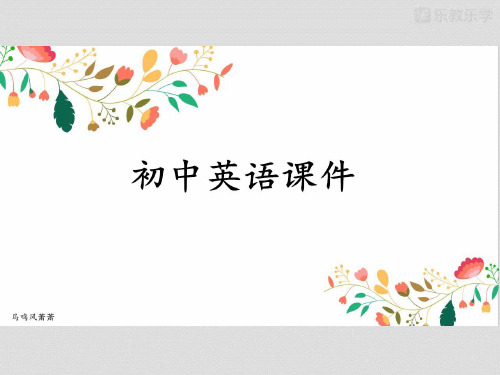
时态 肯定形式 否定形式 疑问形式
一般 过去
S+ was/were
+done
S+ was/were +not+done
Was/Were +S+done?
时
让我们看一看各种句型的主动语态变为被 动语态时,到底发生了什么变化? Mariaboughtthebooklastyear.(主动句)
4.translatethebookintodifferentlangua ge
把书翻译成不同种类的语言 5.allofsudden突然 6.workon从事,进行
用所给词的适当形式填空。
1.Thisinstrumentisusedfor(playp)lmayuisnigcinclas s. wereborrowe
Whenwasteabroughtt ItwasbroughttoKore
oKorea?
aduringthe6thand7th
centuries.
Whatisthehotice-
It’susedforservingr
creamscoopusedfor? eallycoldice-cream.
Thepassivevoice 被动语态
—Whyistheclassroomsodirty? —Sorry,sir.It_______yesterday. Weforgottodoit. A.don’tclean B.didn’tclean C.weren’tcleanedD.wasn’tcleaned
再次阅读翻译语法句子
Whenwasthezipperinvented?
新2024秋季人教版九年级英语全一册Unit6whenwasitinvented?
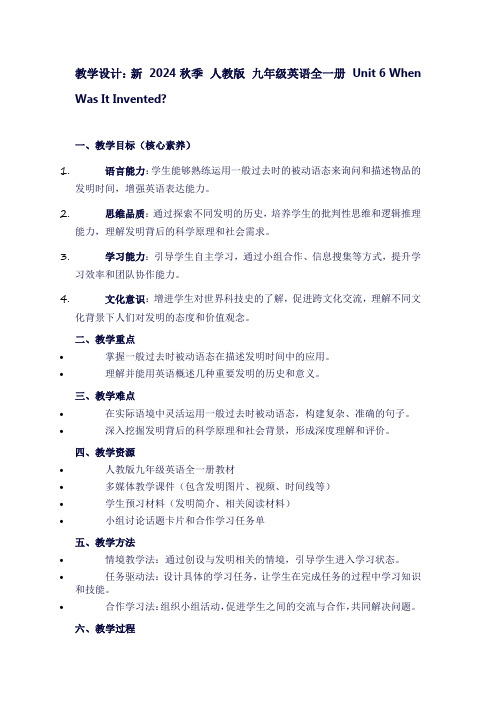
教学设计:新2024秋季人教版九年级英语全一册Unit 6 When Was It Invented?一、教学目标(核心素养)1.语言能力:学生能够熟练运用一般过去时的被动语态来询问和描述物品的发明时间,增强英语表达能力。
2.思维品质:通过探索不同发明的历史,培养学生的批判性思维和逻辑推理能力,理解发明背后的科学原理和社会需求。
3.学习能力:引导学生自主学习,通过小组合作、信息搜集等方式,提升学习效率和团队协作能力。
4.文化意识:增进学生对世界科技史的了解,促进跨文化交流,理解不同文化背景下人们对发明的态度和价值观念。
二、教学重点•掌握一般过去时被动语态在描述发明时间中的应用。
•理解并能用英语概述几种重要发明的历史和意义。
三、教学难点•在实际语境中灵活运用一般过去时被动语态,构建复杂、准确的句子。
•深入挖掘发明背后的科学原理和社会背景,形成深度理解和评价。
四、教学资源•人教版九年级英语全一册教材•多媒体教学课件(包含发明图片、视频、时间线等)•学生预习材料(发明简介、相关阅读材料)•小组讨论话题卡片和合作学习任务单五、教学方法•情境教学法:通过创设与发明相关的情境,引导学生进入学习状态。
•任务驱动法:设计具体的学习任务,让学生在完成任务的过程中学习知识和技能。
•合作学习法:组织小组活动,促进学生之间的交流与合作,共同解决问题。
六、教学过程•视频导入:播放一段关于科技发展的短片,展示人类历史上的重要发明,引发学生兴趣。
•提问互动:教师提问:“你们知道这些发明是什么时候被创造出来的吗?”引导学生思考并回答,自然过渡到本课主题。
新课教学1.词汇预热(可选)•展示与发明相关的词汇,如invention, inventor, create, discover等,学生跟读并尝试造句。
2.阅读理解(针对教材Section B的特定内容)•学生自主阅读教材文本,标注出文中提到的重要发明及其发明时间。
•教师引导学生通过快速阅读找到关键信息,理解文本大意。
Unit+6大单元教学整体单元分析 人教版九年级英语全册

能主动利用图书馆和其他资源进行拓展学习,初步具备自主学习、合作学 习、探究学习的能力,养成良好的学习习惯。 (此部分请结合实际教学设计修改)
[What]
Alex和Carol在谈论一些有趣的发明,如:可以发光的鞋、可以加 热的冰淇淋勺和带可升降鞋跟的鞋子。
[Why]
这篇听力材料旨在让学生了解发明的用途,鼓励学生开动脑筋、创 造可以解决生活实际问题的发明。
[How]
首先,这段对话以一般现在时描述了发明产品的名称、功能和用途。 例如,产品:shoes with lights,功能:the shoes can be used for seeing in the dark,用途:prevent someone hit toes against something on the way to the bathroom at night. 其次,对话中提到的发明都紧扣interesting inventions这个主题, 富有趣味且能解决生活中的实际问题,如:发热冰淇淋勺可以用来挖 被冻得特别硬的冰淇淋、可升降鞋跟的鞋子可以适应各种场合的穿着。 最后,对话中呈现了询问产品用途的句型:What are they / is it used for? They are / It is used for ...
[What]
Paul要做一个题为“改变世界的小发明”的 项目,Roy推荐他讲“拉链”并简要介绍了 拉链的发明史。
[Why]
本语篇旨在鼓励学生了解生活中的小发明的 历史,并且知道应该如何介绍一项发明。
Unit6Whenwasitinvented_重点短语句子及其运用2023-2024学年人教版英语九
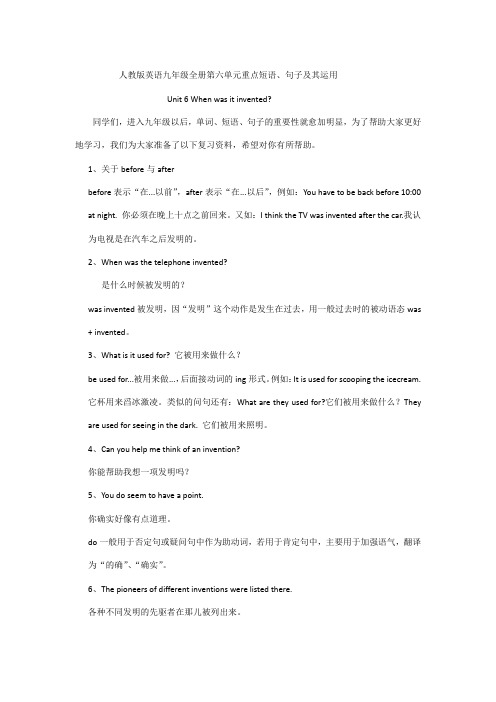
人教版英语九年级全册第六单元重点短语、句子及其运用Unit 6 When was it invented?同学们,进入九年级以后,单词、短语、句子的重要性就愈加明显,为了帮助大家更好地学习,我们为大家准备了以下复习资料,希望对你有所帮助。
1、关于before与afterbefore表示“在...以前”,after表示“在...以后”,例如:You have to be back before 10:00 at night. 你必须在晚上十点之前回来。
又如:I think the TV was invented after the car.我认为电视是在汽车之后发明的。
2、When was the telephone invented?是什么时候被发明的?was invented被发明,因“发明”这个动作是发生在过去,用一般过去时的被动语态was + invented。
3、What is it used for? 它被用来做什么?be used for...被用来做...,后面接动词的ing形式。
例如:It is used for scooping the icecream.它杯用来舀冰激凌。
类似的问句还有:What are they used for?它们被用来做什么?They are used for seeing in the dark. 它们被用来照明。
4、Can you help me think of an invention?你能帮助我想一项发明吗?5、You do seem to have a point.你确实好像有点道理。
do一般用于否定句或疑问句中作为助动词,若用于肯定句中,主要用于加强语气,翻译为“的确”、“确实”。
6、The pioneers of different inventions were listed there.各种不同发明的先驱者在那儿被列出来。
were listed被列出来,一般过去时的被动语态。
人教版九年级英语 Unit 6 When was it invented知识要点

人教版九年级英语Unit6 When was it invented?知识要点语法:1、被动语态(1). 被动语态表示句子的主语是谓语动词所表示的动作承受者。
(2). 被动语态基本结构:be+及物动词的过去分词(如果是不用物动词,其过去分词应带有相应的介词)(3). 被动语态中的be 是助动词,有人称、数和时态的变化。
一般现在时被动语态为:am/is/are+过去分词一般过去时被动语态为:was/were+ 过去分词与情态动词连用的被动语态:情态动词+ be + 过去分词(4). 被动语态中动作的发出者或执行者做介词by的宾语,放在句末,by 表示“由,被”的意思2、如何理解被动语态?为更清晰、更深刻地理解被动语态的含义,可以将主动语态和被动语态的句子结构进行比较。
主动语态:主语+ 谓语动词+ 宾语+ 其他成分被动语态:主语+ be +过去分词+ by +宾语+其他成分如:被动语态English is spoken by many people.课文知识要点:1、When was it invented?它是什么时候发明的?invent v. 发明→inventor n. 发明家→invention n. 发明可数名词invent v. “发明”指发明创造出自然界本来不存在的东西,如工具、方法、手段、汽车、电器、合成材料等。
Bell invented the telephone. 贝尔发明了电话。
Smith invented a new teaching method. 史密斯发明了一种新的教学方法。
Edison, a great inventor, invented over 1’000 inventions all his life.2、What is it used for?它是用来做什么的?be used for“用来做…”;此短语中的for是介词,表示用途,后接名词或动词-ing形式。
九年级英语全册 Unit 6 When was it invented?知识点总结 (新版)人教新目标版
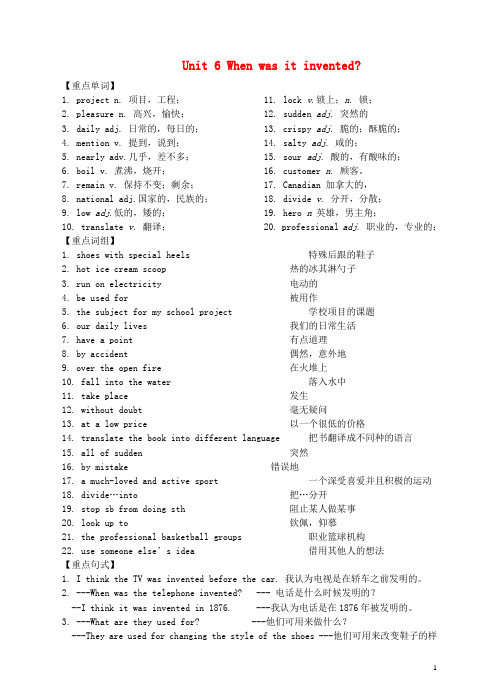
Unit 6 When was it invented? 【重点单词】1. project n. 项目,工程;2. pleasure n. 高兴,愉快;3. daily adj. 日常的,每日的;4. mention v. 提到,说到;5. nearly adv.几乎,差不多;6. boil v. 煮沸,烧开;7. remain v. 保持不变;剩余;8. national adj.国家的,民族的;9. low adj.低的,矮的;10. translate v.翻译;11. lock v.锁上;n. 锁;12. sudden adj. 突然的13. crispy adj. 脆的;酥脆的;14. salty adj.咸的;15. sour adj.酸的,有酸味的;16. customer n.顾客。
17. Canadian 加拿大的,18. divide v.分开,分散;19. hero n英雄,男主角;20. professional adj. 职业的,专业的;【重点词组】1. shoes with special heels 特殊后跟的鞋子2. hot ice cream scoop 热的冰其淋勺子3. run on electricity 电动的4. be used for 被用作5. the subject for my school project 学校项目的课题6. our daily lives 我们的日常生活7. have a point 有点道理8. by accident 偶然,意外地9. over the open fire 在火堆上10. fall into the water 落入水中11. take place 发生12. without doubt 毫无疑问13. at a low price 以一个很低的价格14. translate the book into different language 把书翻译成不同种的语言15. all of sudden 突然16. by mistake 错误地17. a much-loved and active sport 一个深受喜爱并且积极的运动18. divide…into 把…分开19. stop sb from doing sth 阻止某人做某事20. look up to 钦佩,仰慕21. the professional basketball groups 职业篮球机构22. use someone else’s idea 借用其他人的想法【重点句式】1. I think the TV was invented before the car. 我认为电视是在轿车之前发明的。
人教版初中英语九年级全册Unit6Whenwasitinvented教学设计
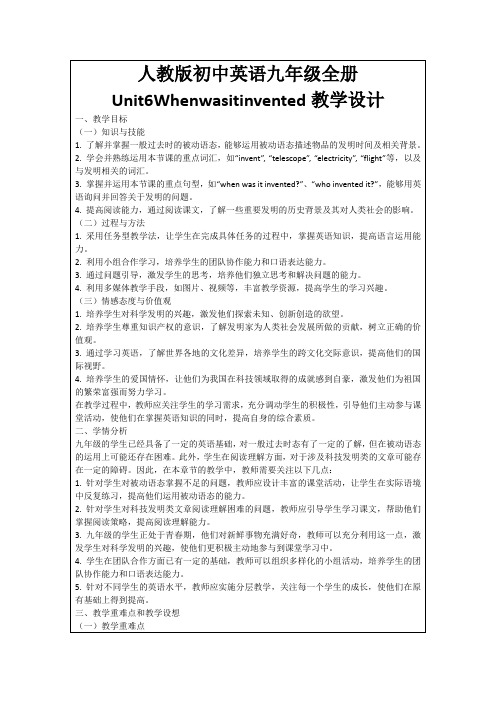
3.九年级的学生正处于青春期,他们对新鲜事物充满好奇,教师可以充分利用这一点,激发学生对科学发明的兴趣,使他们更积极主动地参与到课堂学习中。
4.学生在团队合作方面已有一定的基础,教师可以组织多样化的小组活动,培养学生的团队协作能力和口语表达能力。
2.利用小组合作学习,培养学生的团队协作能力和口语表达能力。
3.通过问题引导,激发学生的思考,培养他们独立思考和解决问题的能力。
4.利用多媒体教学手段,如图片、视频等,丰富教学资源,提高学生的学习兴趣。
(三)情感态度与价值观
1.培养学生对科学发明的兴趣,激发他们探索未知、创新创造的欲望。
2.培养学生尊重知识产权的意识,了解发明家为人类社会发展所做的贡献,树立正确的价值观。
c.采用问题链的形式,引导学生深入阅读课文,通过提问、讨论等方式,帮助学生理解课文内容,并培养他们的批判性思维。
d.创设互动式学习环境,鼓励学生提问和分享,使课堂成为知识交流的平台。
2.教学步骤设想:
a.导入新课:通过展示一些发明物品的图片,激发学生的兴趣,引导他们猜测这些物品的发明时间,自然引入被动语态的学习。
人教版初中英语九年级全册Unit6Whenwasitinvented教学设计
一、教学目标
(一)知识与技能
1.了解并掌握一般过去时的被动语态,能够运用被动语态描述物品的发明时间及相关背景。
2.学会并熟练运用本节课的重点词汇,如“invent”, “telescope”, “electricity”, “flight”等,以及与发明相关的词汇。
3.课后作业设想:
a.设计与课堂活动相关的作业,如让学生选择一ห้องสมุดไป่ตู้发明物品,用英语介绍其发明时间、发明者等,强化学生对被动语态的应用。
九年级英语全册Unit6Whenwasitinvented知识讲解及练习素材
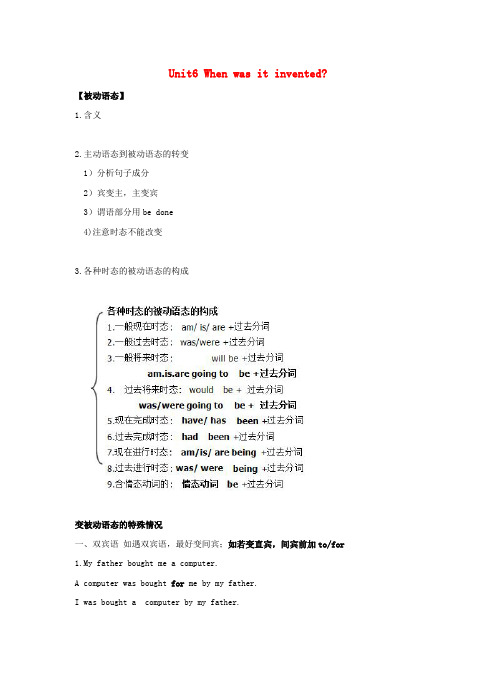
Unit6 When was it invented? 【被动语态】1.含义2.主动语态到被动语态的转变1)分析句子成分2)宾变主,主变宾3)谓语部分用be done4)注意时态不能改变3.各种时态的被动语态的构成变被动语态的特殊情况一、双宾语如遇双宾语,最好变间宾;如若变直宾,间宾前加to/for1.My father bought me a computer.A computer was bought for me by my father.I was bought a computer by my father.2.He gives me a book.A book is given to me by him.I am given a book by him二、无to不定式变为被动时加上to 感官动词真奇怪,被动语态to回来。
We often see him play basketball.He is often seen to play basketball by us.The boss made the children work for long.The children were made to work for long by the boss.三、注意动词短语的完整性take care of/look after/listen to/speak toThe old should be spoken to politely.The baby is taken good care of by the nurse四、不及物动词及系动词无被动语态happen /take place/ die/ rise /come true/ come out/run out被动语态练习一、将下列句子变为被动语态,每空一词。
1.We can finish the work in two days.The work _____ _____ _____ in two days.2.They produce silk in Suzhou.Silk ____ ______ in Suzhou.3.The children will sing an English song.An English song ____ ____ ___ by the children.4.I have given this book to the library.This book ___ ____ ____ to the library.5.Did they build a bridge here a year ago?____ a bridge ____ here by them a year ago?6.We'll put on an English play in our school.An English play ____ ____ _____ on in our school.7.More and more farmers buy color TV sets.Color TV sets ___ ___ ___ more and more farmers.8.We must water the flowers every day.The flowers must ___ ___ (by us) every day.9.They use knives for cutting things.Knives ___ ___ for cutting things.10.You can dig a hole in the earth.A Hole ____ ____ _____ in the earth.二、用动词的正确语态填空。
人教版九年级英语Unit 6 When was it invented。全单元教案
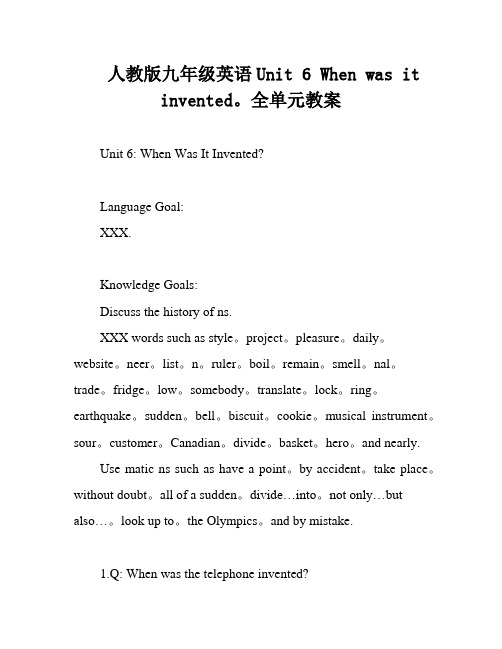
人教版九年级英语Unit 6 When was itinvented。
全单元教案Unit 6: When Was It Invented?Language Goal:XXX.Knowledge Goals:Discuss the history of ns.XXX words such as style。
project。
pleasure。
daily。
website。
neer。
list。
n。
ruler。
boil。
remain。
smell。
nal。
trade。
fridge。
low。
somebody。
translate。
lock。
ring。
earthquake。
sudden。
bell。
biscuit。
cookie。
musical instrument。
sour。
customer。
Canadian。
divide。
basket。
hero。
and nearly.Use matic ns such as have a point。
by accident。
take place。
without doubt。
all of a sudden。
divide…into。
not only…but also…。
look up to。
the Olympics。
and by mistake.1.Q: When was the telephone invented?A: I believe it was invented in 1876 by Alexander Graham Bell.2.Q: Was the TV invented before or after the car?A: There is some doubt about this。
but it is generally accepted that the car was invented before the TV.3.Q: Who invented the zipper?A: XXX XXX.4.Q: What is a hot ice-cream scoop used for?A: A hot ice-cream scoop is used for serving really cold ice-cream.5.XXX was invented by Alexander Graham Bell in 1876.Passive voice can be used to talk about ns。
河南省九年级英语全册Unit6Whenwasitinvented题型总结及解题方法

河南省九年级英语全册Unit6Whenwasitinvented题型总结及解题方法单选题1、In 1958, pinyin ________by Chinese linguist(语言学家)Zhou Youguang and his team. A.designsB.designedC.is designedD.was designed答案:D句意:1958年,中国语言学家周有光和他的团队设计了拼音。
考查一般过去时的被动语态。
designs一般现在时的第三人称单数;designed一般过去时;is designed一般现在时的被动语态;was designed一般过去时的被动语态。
根据In 1958,可知句子时态用一般过去时;而且句子的主语pinyin与谓语动词design是被动关系,所以应用被动语态;一般过去时的被动语态结构为was/were+动词的过去分词,主语是单数,用was,design的过去分词是designed;故答案选D。
2、—Where do you think ________?—I guess they took it in Suzhou.A.was the photo takenB.the photo was takenC.did the photo takeD.the photo took答案:B句意:——你认为照片是在哪里拍的?——我想他们是在苏州拍的。
考查宾语从句。
本题动词“think”后跟宾语从句,从句用陈述句语序,故排除A、C;从句主语“the photo”与谓语动词“take”之间是被动关系,因此用被动语态,故选B。
3、— Look, Cindy. The flowers in our classroom come out in one night.— That's fantastic! They are beautiful and colorful. They________ nice. A.smellsB.smellC.soundsD.sound答案:B句意:——听着,辛迪。
九年级英语:Unit_6_When_was_it_invented____短语及综合测试题
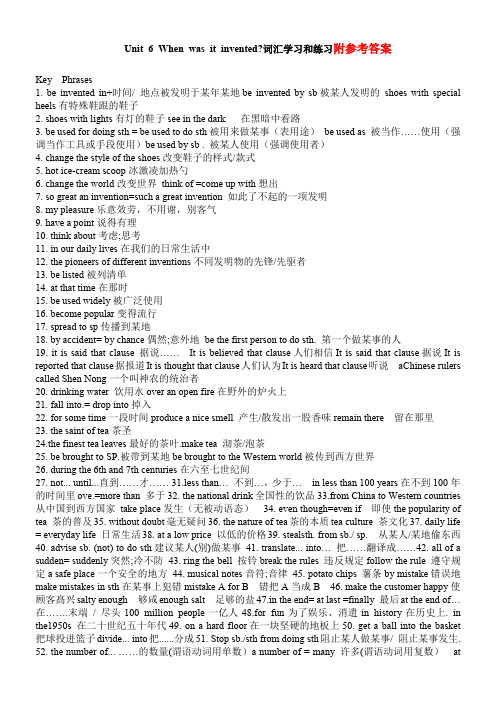
Unit 6 When was it invented?词汇学习和练习附参考答案Key Phrases1. be invented in+时间/ 地点被发明于某年某地be invented by sb被某人发明的shoes with special heels有特殊鞋跟的鞋子2. shoes with lights有灯的鞋子see in the dark 在黑暗中看路3. be used for doing sth = be used to do sth被用来做某事(表用途)be used as 被当作……使用(强调当作工具或手段使用)be used by sb . 被某人使用(强调使用者)4. change the style of the shoes改变鞋子的样式/款式5. hot ice-cream scoop冰激凌加热勺6. change the world改变世界think of =come up with想出7. so great an invention=such a great invention 如此了不起的一项发明8. my pleasure乐意效劳,不用谢,别客气9. have a point说得有理10. think about考虑;思考11. in our daily lives在我们的日常生活中12. the pioneers of different inventions不同发明物的先锋/先驱者13. be listed被列清单14. at that time在那时15. be used widely被广泛使用16. become popular变得流行17. spread to sp传播到某地18. by accident= by chance偶然;意外地be the first person to do sth. 第一个做某事的人19. it is said that clause 据说…… It is believed that clause人们相信It is said that clause据说It is reported that clause据报道It is thought that clause人们认为It is heard that clause听说aChinese rulers called Shen Nong一个叫神农的统治者20. drinking water 饮用水over an open fire在野外的炉火上21. fall into.= drop into掉入22. for some time一段时间produce a nice smell 产生/散发出一股香味remain there 留在那里23. the saint of tea茶圣24.the finest tea leaves最好的茶叶.make tea 沏茶/泡茶25. be brought to SP.被带到某地be brought to the Western world被传到西方世界26. during the 6th and 7th centuries在六至七世纪间27. not... until...直到……才…… 31.less than… 不到…,少于…in less than 100 years在不到100年的时间里ove.=more than 多于32. the national drink全国性的饮品33.from China to Western countries 从中国到西方国家take place发生(无被动语态)34. even though=even if 即使the popularity of tea 茶的普及35. without doubt毫无疑问36. the nature of tea茶的本质tea culture 茶文化37. daily life = everyday life 日常生活38. at a low price 以低的价格39. stealsth. from sb./ sp. 从某人/某地偷东西40. advise sb. (not) to do sth建议某人(别)做某事41. translate... into… 把……翻译成……42. all of a sudden= suddenly突然;冷不防43. ring the bell 按铃break the rules 违反规定follow the rule 遵守规定a safe place一个安全的地方44. musical notes音符;音律45. potato chips 薯条by mistake错误地make mistakes in sth在某事上犯错mistake A for B 错把A当成B 46. make the customer happy使顾客髙兴salty enough 够咸enough salt 足够的盐47.in the end= at last =finally 最后at the end of…在…….末端/ 尽头100 million people一亿人48.for fun为了娱乐、消遣in history在历史上. in the1950s 在二十世纪五十年代49. on a hard floor在一块坚硬的地板上50. get a ball into the basket 把球投进篮子divide... into把......分成51. Stop sb./sth from doing sth阻止某人做某事/ 阻止某事发生.52. the number of... ……的数量(谓语动词用单数)a number of = many 许多(谓语动词用复数)atthe same time 同时53. look up to钦佩;仰慕54.encourage sb. to do sth.鼓励某人做某事not only... but also... 不仅……而且…… e up with = think up 想出56.become an Olympic event成为一项奥运会项目the popularity of … …的流行,普及57.achieve one’s dreams 实现某人梦想58. dream of doing sth梦想干某事一选择题( ) 1.Mo Yan is famous _______ an excellent writer. And China is famous ______ culture.A. for; asB. as; forC. because; asD. as; for( ) 2. --When will A Bite of China II begin tonight?--It ________ for ten minutes.A. will beginB. has begunC. will be onD. has been on( ) 3. Sixteen-year-olds shouldn’t ______ to go to an Internet bar.A. be allowedB. be allowC. allowD. are allowed( ) 4. ---I’m not hungry but thirsty.---________A I’m hungry, too.B What about some cakes?C I’m happy to hear that.D How about a glass of water?( ) 5.— We can use QQ to talk with each other online.— Really? Could you please show me _______ it?A. what to doB. how to doC. when to doD. why to do( ) 6.As we know, _____of us likes pollution.A. no oneB. noneC. someoneD. nothing( ) 7.—Lily, _____ you _____ your ticket?—Not yet!A. did; findB. have; foundC. has; foundD. do; find( ) 8.When we went into the park, we were saw _____ Chinese Kungfu.A. playsB. played C .to play D. playing( ) 9.The invention was Wednesday afternoon.A. invented,inB. invented ,onC. inventing,of D, invent,for( ) 10. --------Remember this , children .________ you study,________ knowledge you will get.--------We know, Mr. Green.A. The harder, the lessB. The hard, the moreC. The harder, the moreD. harder, more( ) 11. Our teacher told us that the eartharound the sun.A. wentB. goC. goesD. would go( ) 12. Our classroom _____ every day, so it’s very clean.A. cleansB. is cleaningC. is cleanedD. cleaned( ) 13. Would you like to tell me _________next, Mr. Feng?A. what should we doB. we should do whatC. what we should doD. should we do what ( ) 14.——How is your grandma? ——She’s fine. She used to _____TV at home after supper. But now she is used to _____out for a walk.A. watch; goB. watching; goC. watching; goingD. watch; going( ) 15.Windows _________ glass,the paper ________ bamboo. A. be made of , be made ofB. are made of , is made ofC. are made of ,is made fromD. are made from., is made of( ) 16. — My dream is to build university on the moon some day.— It sounds likeunusual dream. I wish you could realize it.A. a; aB. an; aC. a; anD. an; an( ) 17. I didn’t think maths _______ important at that time.A. isB. wereC. areD. was( ) 18.nice glasses! Where did you buy them?A. HowB. What aC. WhatD. How( ) 19. Excuse me, would you please tell me ______buy a digital camera on line?A. what to B .how to C. what I can D. how can I( ) 20. Someone says, “Money is everything.” But I think time is _____ important than moneyA. muchB. lessC. much leastD. even more( ) 21 ____ Jack ____ Jim has been to to China, but ___ of them knows little about China in fact.A. Either; or; bothB. Neither; nor; bothC. Not only; but also; neitherD. Both;and; neither( ) 22.We don't know _________ he will come tomorrow._________ he comes,We 'll tell you.A.if;Whether B.whether;Whether C.if;That D.if;If()23.The knife is used ________ cutting.A.for B.as C.by D./()24.—I'm very________ with my own cooking. It looks nice and smells delicious.—Mm, it does have a ________ smell.A.pleasant; pleased B.pleased; pleased C.pleasant; pleasant D.pleased; pleasant ()25.The song came to my ears ________ accident.A.by B.with C.in D.for()26.The meeting ________ last Sunday night.A.happening B.happened C.took place D. takes place()27.Who were the zippers invented ________?A.by B.for C.with D.at()28.—Thanks for the delicious food. —________.A.No, thanks B.That's right C.All right D.My pleasure()29.The corn, potato and tomato are plants that were first ______ in America by Columbus.A.invented B.grown C.discovered D.found out()30.The car ________ by the policeman because the driver was drunk (喝醉的).A.stopped B.was stopped C.were stopped D.stops二完形填空Some years ago, Chinese high school students would show their school-bags, new clothes or new pens to their classmates when the new term started, Today, however, all have 1 .If you still come back to school 2 only these things, you are falling out-of-date(过时). Students in big cities like to bring the latest high-tech things to school, and feel happy and 3 to show off(炫耀) these things to_4_. Mobile phones, MP3 players, CD players, electronic dictionaries, the list is endless.Young people think that, living in the twenty-first century, they must keep up with the _5. They don’t want to fall 6_ . Besides, they think _7_ they need to keep in touch with their classmates, so they need mobile phones. They also like to _8_ the pop music, so they need CD players. They explain that, 9_ like electronic dictionaries, these can be _10 in their study, 11 . They think that their parents should understand 12_ they want these things.Foreign students will also bring some latest high-tech things when they 13to school at the beginning of a new term. _14_ , they often use the money which they made by themselves during the holiday to 15_ these high-tech things that they want.( ) 1. A. changed B. come C. joined D. stopped ( ) 2. A. to B. from C. of D. with( ) 3. A. right B. lucky C. nice D. pleased ( ) 4. A. other B. the other C. others D. he others( ) 5. A. times B. days C. years D. date ( ) 6. A. down B. off C. behind D. back( ) 7. A. that B. how C. if D. which ( ) 8. A. hear B. listen to C. read D. play( ) 9. A. look B. just C. feel D. something ( ) 10. A. new B. modern C. latest D. useful( ) 11. A. also B. too C. either D. then ( ) 12. A. where B. which C. what D. why( ) 13. A. return B. return back C. reach D. arrive ( ) 14. A. But B. However C.So D. Still( ) 15. A. borrow B. buy C. lend D. take三首字母填空。
人教版九年级英语全册:Unit 6 基础知识梳理
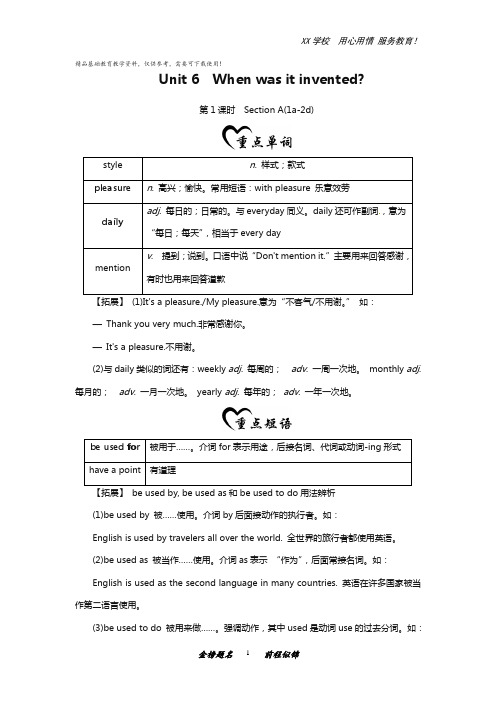
精品基础教育教学资料,仅供参考,需要可下载使用!Unit 6 When was it invented?第1课时Section A(1a2d)style n. 样式;款式pleasure n. 高兴;愉快。
常用短语:with pleasure 乐意效劳daily adj. 每日的;日常的。
与everyday同义。
daily还可作副词,意为“每日;每天”,相当于every daymention v. 提到;说到。
口语中说“Don't mention it.”主要用来回答感谢,有时也用来回答道歉【拓展】(1)It's a pleasure./My pleasure.意为“不客气/不用谢。
”如:—Thank you very much.非常感谢你。
—It's a pleasure.不用谢。
(2)与daily类似的词还有:weekly adj. 每周的;adv. 一周一次地。
monthly adj. 每月的;adv. 一月一次地。
yearly adj. 每年的;adv. 一年一次地。
be used for被用于……。
介词for表示用途,后接名词、代词或动词ing形式have a point 有道理(1)be used by 被……使用。
介词by后面接动作的执行者。
如:English is used by travelers all over the world. 全世界的旅行者都使用英语。
(2)be used as 被当作……使用。
介词as表示“作为”,后面常接名词。
如:English is used as the second language in many countries. 英语在许多国家被当作第二语言使用。
(3)be used to do 被用来做……。
强调动作,其中used是动词use的过去分词。
如:This mac hine is used to clean the floor. 这个机器是用来扫地的。
2014九年级英语Unit_6_when_was_it_invented_Section_A(4a-4c)
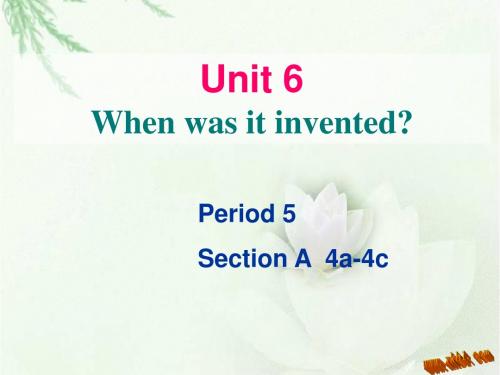
4c Decide whether active or passive forms should be used in these sentences. Write the correct forms in the blanks
The
telephone was invented(invent) by Alexander Graham Bell. He was born (born) in 1847. Alexanderworked(work) on the invention of the telephone with Thomas Watson. In 1875, Alexander learned \ learnt (learn) to send musical notes through an instrument similar to a telephone.
Unit 6
When was it invented?
Period 5 Section A 4a-4c
When were the following things invented? Choose the right time.
1967 1976
1876
1786
1885
1727
What are these and what are they used for?
再次阅读翻译语法句子
When
was the zipper invented? Who was it invented by? When was tea brought to Korea? What is the hot ice-cream scoop used for?
It was invented in 1893. It was invented by Whitcomb Judson. It was brought to Korea during the 6th and 7th centuries. It’s used for serving really cold icecream.
2018届九年级英语人教新课标版全册Unit6 When was it invented 4
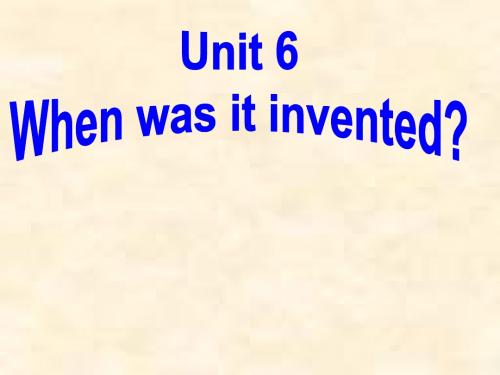
Let`s listen and fill in the blanks.
The last invention is shoes with special up heels _____. People can move the heels _____ and ______. You can raise the heels if you down party or lower them if are going to a ______ shopping you are just going out for _________.
heel n. 鞋跟; 足跟
scoop n. 勺; 铲子
electricity n. 电; 电能
I like the style . n. 样式; 款式
What are they used for ?
shoes with lights
hot ice-cream scoop
Shoes with special heels
on the way to the bathroom at night. So people seeing can use them for ________ in the ______. dark The second invention is a special ice-cream scoop ______. It runs on _________ electricity and becomes hot. It’s _____ used for serving really _____ cold icecream.
--When was the…invented? --It was invented in… _d__ _a_ _ _c__ _b__ 1876 1885 1927 1971
九年级英语全册 Unit 6 When was it invented知识点总结 人教版
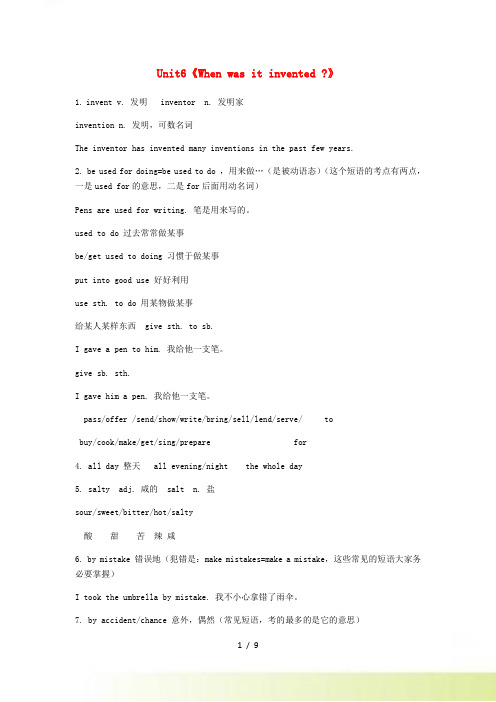
Unit6《When was it invented ?》1.invent v. 发明 inventor n. 发明家invention n. 发明,可数名词The inventor has invented many inventions in the past few years.2. be used for doing=be used to do ,用来做…(是被动语态)(这个短语的考点有两点,一是used for的意思,二是for后面用动名词)Pens are used for writing. 笔是用来写的。
used to do 过去常常做某事be/get used to doing 习惯于做某事put into good use 好好利用use sth. to do 用某物做某事给某人某样东西 give sth. to sb.I gave a pen to him. 我给他一支笔。
give sb. sth.I gave him a pen. 我给他一支笔。
pass/offer /send/show/write/bring/sell/lend/serve/ tobuy/cook/make/get/sing/prepare for4. all day 整天 all evening/night the whole day5. salty adj. 咸的 salt n. 盐sour/sweet/bitter/hot/salty酸甜苦辣咸6. by mistake 错误地(犯错是:make mistakes=make a mistake,这些常见的短语大家务必要掌握)I took the umbrella by mistake. 我不小心拿错了雨伞。
7. by accident/chance 意外,偶然(常见短语,考的最多的是它的意思)I met her by accident at bus stop.我在公共汽车站意外地见到了她。
九年级英语全册 Unit 6 When was it invented教案 人教新目标版(2021
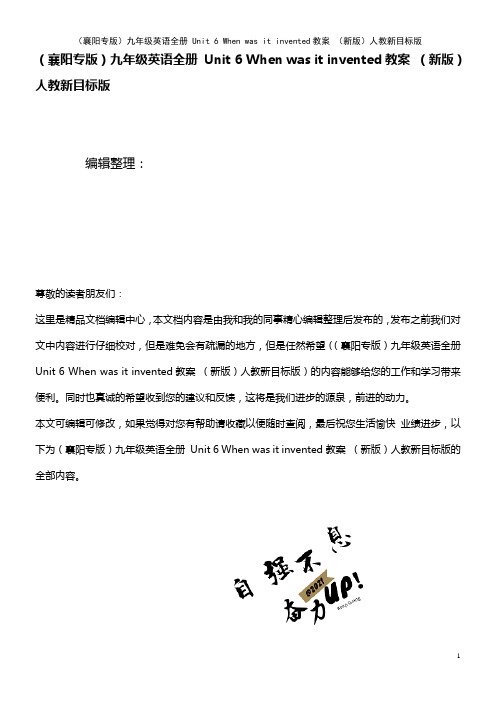
(襄阳专版)九年级英语全册Unit 6 When was it invented教案(新版)人教新目标版编辑整理:尊敬的读者朋友们:这里是精品文档编辑中心,本文档内容是由我和我的同事精心编辑整理后发布的,发布之前我们对文中内容进行仔细校对,但是难免会有疏漏的地方,但是任然希望((襄阳专版)九年级英语全册Unit 6 When was it invented教案(新版)人教新目标版)的内容能够给您的工作和学习带来便利。
同时也真诚的希望收到您的建议和反馈,这将是我们进步的源泉,前进的动力。
本文可编辑可修改,如果觉得对您有帮助请收藏以便随时查阅,最后祝您生活愉快业绩进步,以下为(襄阳专版)九年级英语全册Unit 6 When was it invented教案(新版)人教新目标版的全部内容。
Unit 6 When was it invented?类别课程标准要求掌握的项目单元话题 In this unit, students learn to talk about the history ofinventions。
单元语法Passive voice (past tense)教学目标1。
能掌握以下句型:①—When was the telephoneinvented?—I think it was invented in 1876。
②—What are they used for?-They are used for seeing at night。
2。
能谈论物品被发明的时间、发明者,表达某发明的用途。
3。
了解一些近现代发明的时间及用途,激发自己热爱发明的情感。
培养学生善于观察事物,面对难题,用积极的态度去解决,发挥想象力,认识世界,改造世界,拥有强烈求知欲的素养。
学情分析本单元话题是发明,学生们对发明不太熟悉,因此教师在讲前应普及下有第一课时Section A(1a~2d)错误!错误!错误!错误!错误!错误!错误!错误!错误!§自主学习案翻译下列词组.1.特殊后跟的鞋子shoes__with__special__heels2.热的冰淇淋勺子hot__ice。
- 1、下载文档前请自行甄别文档内容的完整性,平台不提供额外的编辑、内容补充、找答案等附加服务。
- 2、"仅部分预览"的文档,不可在线预览部分如存在完整性等问题,可反馈申请退款(可完整预览的文档不适用该条件!)。
- 3、如文档侵犯您的权益,请联系客服反馈,我们会尽快为您处理(人工客服工作时间:9:00-18:30)。
二、单项选择。 ( D )6.The woman took my bag ________ mistake. A.for B.at C.of
D.by
( C )7.My little sister isn't ________ to look after herself.(易错题) A.young enough B.enough young C.old enough D.enough old ( A )8.The potato chips have been in the paper bag for half an hour.They are not ________ any more. A.crispy B.sweet C.salty D.sour ( D )9.—It's 9 o'clock now.I must go. —It's raining outside.Don't leave ________ it stops.(原创题) A.when B.since C.while D.until ( B )10.Please give this book to a boy ________ Zhang Ming. A.call B.called C.calling D.to call
3.Jane likes crispy cookies.They are dry,hard and easily broken (易碎的).
4.The boy got to the top of the mountain in the end .
5.DoБайду номын сангаас't add too much salt in the soup,or it will be too salty .
一、根据句意选择方框中的单词并用其适当形式填空。
end,customer,sour,salt,crispy
1.I don't like drinking lemon juice because it's too sour . 2.The supermarket is usually crowded with lots of customers on weekends.
Unit 6
When was it invented?
Section B (1a-1e)
第四课时
►salty形容词,意为“咸的;含盐的”,是由名词salt加上-y构成的,类 似的形容词还有tasty,smelly,sunny,cloudy等。 ►Potato chips were invented by mistake.薯条是被无意中发明的。 by mistake意为“错误地;无意地”。在此短语中mistake要用单数形式, 且前面不能用冠词。 【拓展】make a mistake犯错误 mistake...for...把……错认为…… ►The customer was happy in the end.最后顾客满意了。 in the end意为“最后,最终”,相当于at last/finally。 eg:They were out of danger in the end.最后他们脱险了。
A.He thought the customer would hate them.
B.Oh,do you know that potato chips were invented by mistake? C.And the customer loved them and asked for more. D.One day,a customer came into the restaurant where George worked. E.And we are still eating them today.
【拓展】①in the end不能与of连用,可放在句首,也可放在句末。 ②at the end of...后接地点名词,表示“在……的尽头”;后接时间名 词,表示“在……结束时”。 eg:at the end of the road/month在这条路/这个月的尽头 ③by the end of意为“在……以前,到……为止”,常与将来时态或过 去完成时态连用。 eg:By the end of last month,we had learnt over ten English songs.到上 个月底为止,我们已经学会了十多首英文歌曲。 ►enough的用法 ①enough作形容词,意为“足够的;充分的”,后接名词; ②作副词,意为“足够地;充分地”,总放在被修饰的副词或形容词 之后。 eg:I have enough food to eat.我有足够的食物吃。(修饰名词) The book is easy enough for your children to read.这本书对你的孩子们而 言很简单。(修饰形容词) They can't walk fast enough.他们走得不够快。(修饰副词)
三、从方框中选出适当的句子补全对话。 A:I have some potato chips.Do you want to eat? B B:No,thanks.11.____ A:What do you mean?Why was it an accident? D He B:Well,they were invented by a cook called George Crum.12.____ ordered a plate of fried potatoes.When the potatoes came,he said they were cut too thick and sent them back to the kitchen. A:So what happened? B:Well,George was angry,so he cut the potatoes very thin,and he cooked them for a long time until they were crispy.And he put lots of salt on them so they were really salty.13.____ A A:And? B:14.____ C He told the other customers about them,and soon everyone was ordering potato chips. E How interesting! A:15.____
